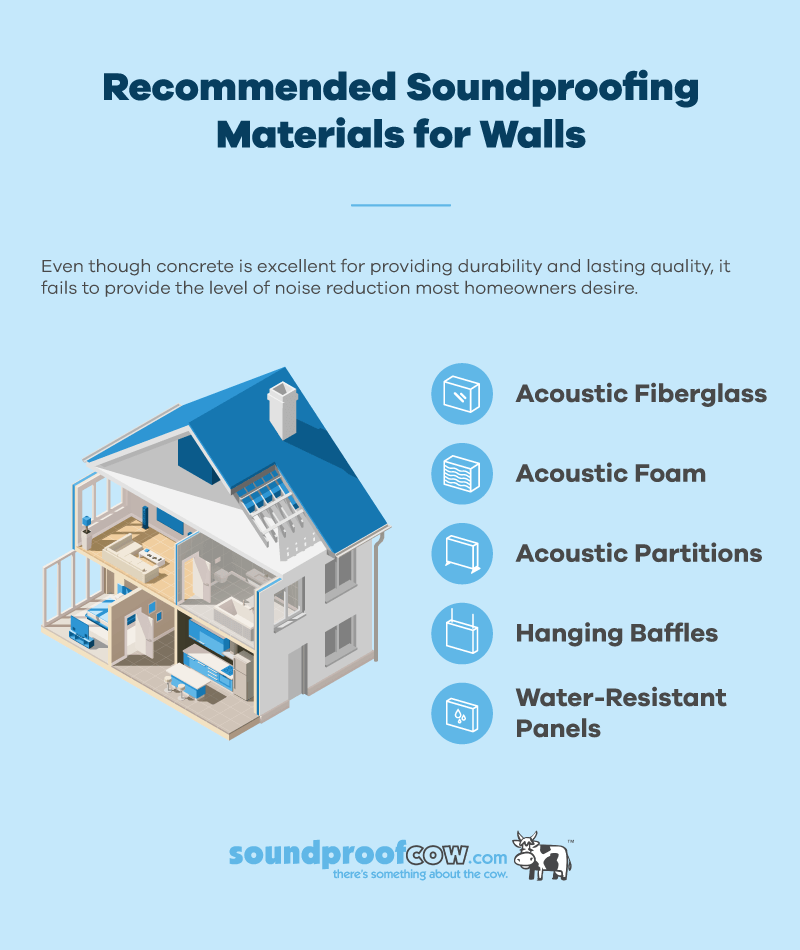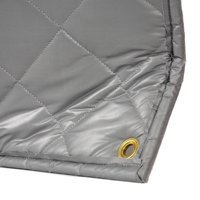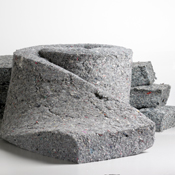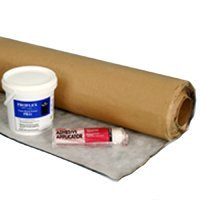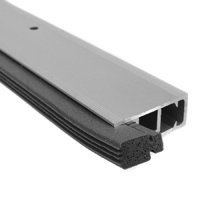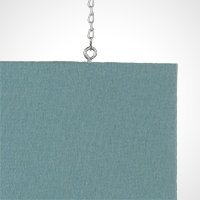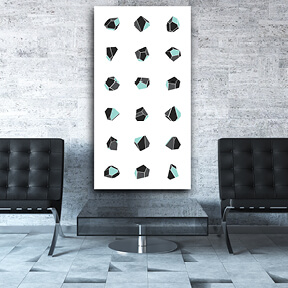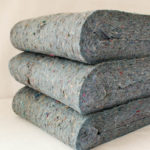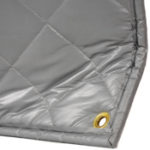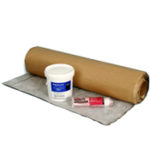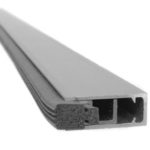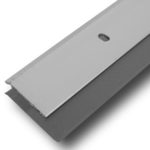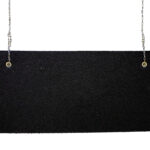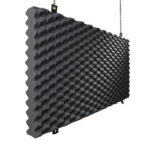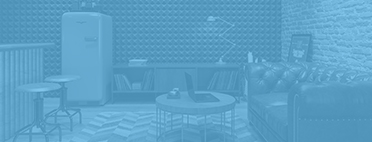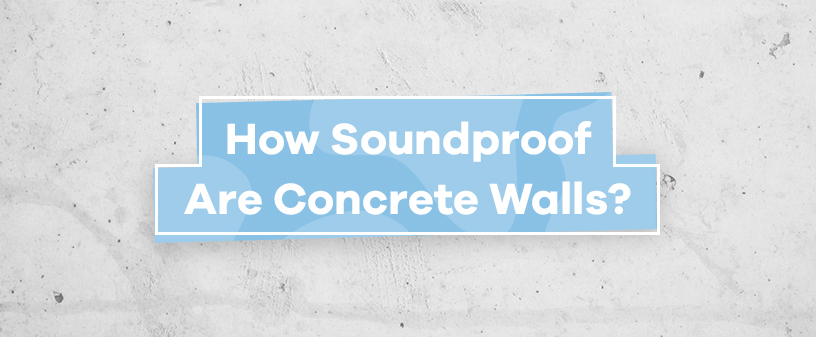
Chances are, you once lived or currently find yourself residing in a home with concrete walls. That’s because concrete is one of the most common building structures used throughout the country for both homes and businesses.
Not quite sure if your walls are concrete or plaster? A quick knock should do the trick! When you tap on your walls, a concrete wall will not echo nor be easy to move or impact. Drywall and plaster are simple to affect, and you can produce holes with minimal effort.
How Soundproof Is Concrete?
Concrete is the standard building material for a reason. It’s sturdy and provides withstanding use over long periods of time. Concrete also boasts versatile properties that make it well-suited for many different environments and surroundings. Most consumers love that this material doesn’t require a significant amount of money out of pocket, either. But one thing concrete can’t quite claim to provide is great soundproofing quality.
Even though concrete is excellent for providing durability and lasting quality, it fails to provide the level of noise reduction most homeowners desire. Many people mistakenly believe concrete’s thickness automatically makes it an incredible soundproofing barrier, but this is not entirely the case. It is not the width of a material that causes soundproofing properties but rather the construction of the product instead.
Sound Transmission Through Concrete Floors
While many people choose concrete as their designated building material based on its hardness and durability, it’s this very quality that prevents concrete from improving acoustical performance.
If you have a concrete floor, you may notice that every step produces an audible sound. Impact noises are a byproduct of concrete’s rigidity, which transforms movement into an audible experience. While undesirable, these noisy manifestations can be eliminated with a few soundproofing measures.
How to Soundproof Concrete Walls, Flooring & Ceilings
If your home or business currently suffers from unwanted noises generated by concrete floors or walls, a few precautionary measures can help you obtain the quietness you desire. Eliminate unwanted distractions and welcome in the peacefulness of the silence you require to perform each of your daily tasks with success. Don’t suffer through noise — opt for soundproofing measures to help block unwanted sound.
Soundproofing Concrete Walls
Noisy walls are a common problem in communal living spaces like apartments and townhomes. It’s easy to think that concrete is a solid soundproofing material due to its rugged nature, but you’ll likely still hear sound from connecting neighbors when you have shared concrete walls in your basement or another part of your residential space.
You can soundproof concrete walls using several methods.
1. Incorporate New Drywall Layers
If you’re an experienced renovator, you might consider building a layer of drywall around your concrete walls. The best part about this method is that there is no demolition necessary — you can keep your concrete walls standing and construct around them. Note that building drywall directly against concrete will still allow noise to travel through the surfaces. Decoupling or keeping a gap between drywall and concrete walls will create an air chamber to trap reverberations and reduce sound.
Our Quiet Batt® Insulation provides a layer of friction between your walls that guarantees minimized sound transmission into and out of your room. Best of all, this user-friendly product makes installation and application a breeze, ensuring you can enjoy the benefits of a soundproof wall sooner. Position Quiet Batt® Insulation materials between your drywall and concrete surface for noticeable results. This treatment project works both ways — you and your neighbors can enjoy a quieter environment.
2. Hang Up an Acoustic Quilt
Acoustic blankets and quilts make outstanding temporary treatments for concrete walls. If there’s ever a situation where you’re trying to minimize the transfer of noise from your basement or the neighbors are too loud, an acoustic quilt can do the trick.
These products look similar to traditional blankets, except they are manufactured with fiberglass-based materials to absorb airborne noise. Position the portable sound barriers in problem areas and enjoy their incredible flexibility in your home.
Shop Wall Soundproofing Materials
Soundproofing Concrete Floors
Weak points in a concrete floor are usually the culprits for unwanted noise passing through the surface. When floors have holes or air pockets inside of them, sound can move in or below your space easily, too. Most of the time, increasing the mass of your concrete floors is an effective strategy for making your rooms quieter.
1. Incorporate Flooring Underlayments and Sealants
Adding our Proflex™ 90 floor underlayment helps dampen sound production that transfers throughout your room with every step. If your floor or wall has any cracks that make it susceptible to noise transmission, consider investing in an acoustic sound sealant as well. Covering up any weak spots will help your room reach the level of soundproofing you desire.
2. Place Door Seals and Sweeps Along Floors
Door seals and sweeps are helpful in controlling noisy concrete floors. This is especially true when sound is traveling from connected hallways and rooms. Door seals and sweeps fit underneath entry doors in minutes and give you peace and quiet when the neighbors refuse to turn the music down or speak at a reasonable volume.
Soundproofing Concrete Ceilings
Approaches for soundproofing concrete ceilings are similar to treating walls. It’s important to recognize that all ceilings and structures are engineered differently, so one of the following methods may be better suited for you based on your circumstances.
1. Integrate Acoustic Panels or Baffles
Installing acoustic panels or hanging baffles is a cost-effective solution for reducing noise that comes through concrete ceilings. You might prefer these products in cases where you’re renting a living space and further construction is not an option. Panel and baffle solutions are available in different sizes, thicknesses and colors to match the vision you have for your space. The larger and thicker the materials, the better sound absorption capabilities when attached to concrete.
You can install acoustic panels and baffles quickly using hooks or user-friendly adhesives.
Request an Acoustic Panel Quote
2. Reconstruct the Ceiling
If your budget allows, installing a drop ceiling might be a feasible solution. This process involves adding metal bars to install layers of drywall away from your concrete ceiling. Depending on your level of experience, dropping your ceiling 3 or 4 inches may require the help of a professional. Be sure to think about the thickness of the plasterboard and drywall you’ll apply and whether you’ll place insulation materials between the surfaces for greater sound reduction.
Improve Your Acoustical Performance With Soundproof Materials for Concrete Walls & Floors
While noise can be an unwanted byproduct of your concrete interior, it doesn’t have to be. Investing in the right high-quality soundproofing materials can help you obtain the level of noise and reverberation reduction you desire.
Soundproof Cow offers all of the necessary products to help you achieve the peace you deserve throughout the day. To learn more about our products, be sure to contact us with any further questions about soundproofing concrete walls or floors.
Learn More About Wall Soundproofing
- How to Soundproof with Minimal Damage to Walls
- How to Soundproof a Wall
- How to Soundproof a Wall Behind a TV



